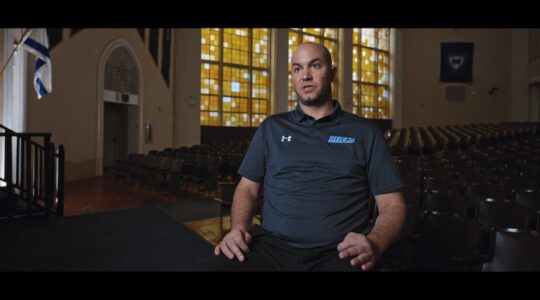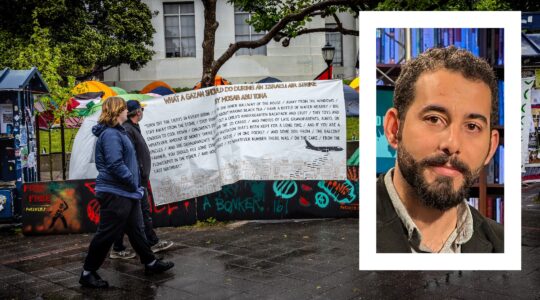Marcy and I talked yesterday about what, if anything, we should cover about last week’s massacre at Ft. Hood; the alleged killer, Maj. Nidal Malik Hassan, was born here to Palestinian parents. A radical take on Islam, at least in part, drove him, apparently, to commit murder.
I told Marcy that we should apply the same standard we do for Jews. In recent months, for instance, we haven’t covered every financial miscreant who may or may not be Jewish; the ones who are deeply involved in the community, who spend their money on Jewish causes — the Madoffs, the Abramoffs — definitely make the cut. Others do not.Others, it’s a tough call.
For instance, on my Washington turf: Dan Snyder is by no means a financial miscreant, but his controversial ownership of the Washington Redskins, the Six Flags amusement park chain and his ventures into other entertainment arenas, have engendered reams of copy. We don’t cover it because — although we know he was born Jewish — it doesn’t touch on the community. He doesn’t claim Judaism drives his decisions.
At times, this gets dicey. I had to make a difficult call in October of 2005 to cover the indictment of Lewis "Scooter" Libby, the aide to Vice President Dick Cheney who was embroiled in the retaliatory White House leak that exposed Valerie Plame as a CIA operative.
Libby’s Jewish involvement was minimal: He belonged to a temple; He had attended a couple of Republican Jewish Colaition events (but so, for that matter, do a lot of Republican officials who are not Jewish).
But Libby’s faith had already greased a lot of speculation — however unfounded — about his motive in helping to gin up support for the Iraq War, and it would inevitably reverberate. Was I fueling this misconceived speculation by reporting his Jewish ties? It was a hugely tough call, as I said. I was sort of vindicated, I think, when many of the luminaries who later pleaded for sentence leniency were Jews who were, indeed, deeply involved in the community.
So, back to Hasan; we know about the radical Islam; we know about his anger at the Afghan and Iraq wars; we know nothing so far about whether he threw Israel-Palestine into this mix. (And nothing, when you’re reporting, is a "given.") Until that emerged, I thought, we should leave it alone.
I think Marcy’s call, though, was ultimately correct: Hasan had discussed his faith and his perceived persecution with Palestinian relatives; this merited a brief. (We topped it off with Joe Lieberman’s declaration that it might be a terrorist act.)
This is a thorny matter, if only because we’re talking about an alleged lone gunman and it has yet to be determined how influenced he was by Islamist thinking and, more specifically, homegrown Islamist thinking.
I think Richard Silverstein gets it right in this thoughtful take on his Tikun Olam website:
The motives for the crime are a jumble of the personal, psychological, professional, religious and sectarian. As is rarely the case in these circumstances, much is grey, and little is black and white except the huge burden of suffering Maj. Nidal Hassan inflicted on the victims and their families.
Though Maj. Hassan’s family emigrated to the U.S. from Ramallah in the 1960s it does not appear, at least at first glance, that the Arab-Israeli conflict was one of his primary grievances. He had other things troubling him more. First, sharing the searing pain of his patients who were veterans of the Afghan and Iraq wars. Second, his own imminent deployment to the war zone and all the existential fears this must have invoked. Third, his escalating opposition to those two wars on the soil of Muslim nations. Fourth, his conviction that his religion was disrespected in the military ranks.
I also think — and not contra-instinctively — that Jeffrey Goldberg gets it right here:
It seems, though, that when an American military officer who is a practicing Muslim allegedly shoots forty of his fellow soldiers who are about to deploy to the two wars the United States is currently fighting in Muslim countries, some broader meaning might, over time, be discerned, especially if the officer did, in fact, yell "Allahu Akbar" while murdering his fellow soldiers, as some soldiers say he did. This is the second time this year American soldiers on American soil have been gunned down by a Muslim who was reportedly unhappy with America’s wars in the Middle East (the first took place in Arkansas, to modest levels of notice). And, of course, this would not be the first instance of an American Muslim soldier killing fellow soldiers over his disagreements with American foreign policy; in 2003, Army Sgt. Hasan Akbar killed two officers and wounded fourteen others when he rolled a grenade into a tent in a homicidal protest against American policy.
(Goldberg, I think, gets it wrong, though, when he ellides from how his colleagues at the Atlantic have played down Hasan’s faith to his belied that entire "media elites" are doing the same. I’ve been following this in the New York Times, the AP and the Washington Post, and these publications, at least, have not shied away from taking into account Hasan’s Islamist beliefs.)
Like I said, Hasan is, allegedly, a lone gunman; that would mean Islamism is a factor only to the degree that it influenced him. It requires comparing the ideas to which he was exposed to the ideas he expressed; it requires teasing out — to the degree we can — how much those ideas motored his actions, discrete from his personal demons.
JTA has documented Jewish history in real-time for over a century. Keep our journalism strong by joining us in supporting independent, award-winning reporting.





